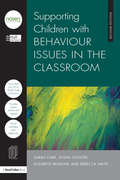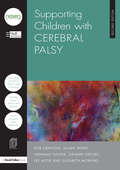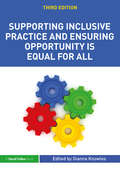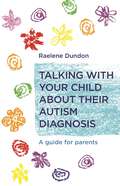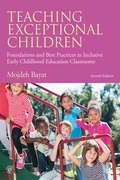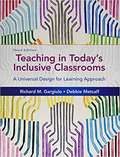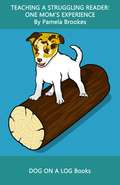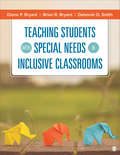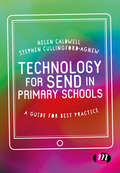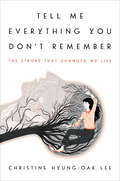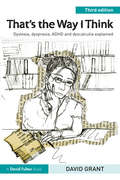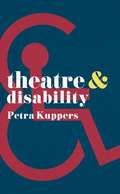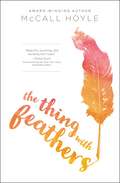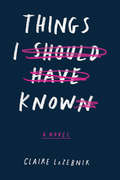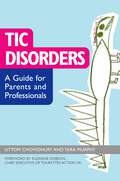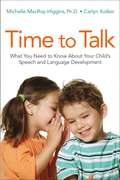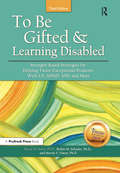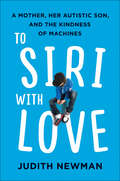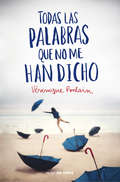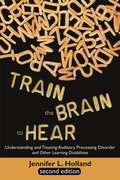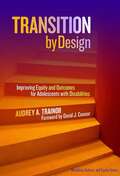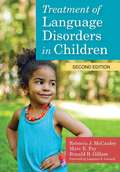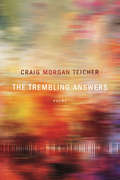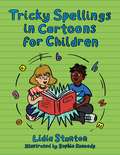- Table View
- List View
Supporting Children with Behaviour Issues in the Classroom
by Hull City CouncilThis completely revised edition is an easy to use resource for teachers, TAs and SENCOs concerned about behavioural issues in the classroom. It will support school staff in their approach to a range of behavioural issues, through a range of tried-and-tested strategies, including: How to create an environment of support and acceptance Techniques to provide an effective leaning environment Ways in which to communicate clearly with children with poor communication skills Whole class and whole school approaches for a positive learning environment How to maintain appropriate behaviours during unstructured break times This accessible reference tool will help any teacher to create and maintain a classroom environment conducive to learning. Packed with resources, it also includes templates and example Personal Support Plans, written by practitioners for practitioners.
Supporting Children with Cerebral Palsy (nasen spotlight)
by Hull City CouncilCompletely revised and fully updated in light of the 2014 SEND Code of Practice, this edition familiarises readers with the specific learning needs of cerebral palsy. Offering practical tips and tried-and-tested strategies from professional practitioners, this accessible guide provides advice on how to meet the needs of young people with cerebral palsy. This new edition presents all of the information practitioners will need to know to deliver outstanding provision for young people with cerebral palsy and support the inclusion of children and young people with cerebral palsy into mainstream schools. The far-reaching advice found within this guide includes: Planning for a pupil with cerebral palsy Accessing the curriculum, including specific advice on each subject area How to make effective use of support staff Developing independence skills Liaising between home and school Making the transition into adulthood With accessible materials, such as checklists, templates and photocopiable resources, this up-to-date guide will enable teachers and other professionals to feel more confident and effective in the support they can provide.
Supporting Inclusive Practice and Ensuring Opportunity is Equal for All
by Gianna KnowlesThis third edition of Supporting Inclusive Practice builds on the successful format of the previous two editions, both in content and structure. It explores many aspects of inclusive practice relevant to those who work with children in schools and other educational settings, aiming to provide the most up-to-date theoretical knowledge and understanding in the field, and illustrating the theory with examples of good practice in the areas explored. Many of the topics that have appeared in the previous editions, including supporting children for whom English is a second language, children on the autistic spectrum and children with neurodiversity conditions, also appear in this edition. The revised content of this third edition also covers recent and relevant changes in national policy and legislation, particularly, for example, around changes in equality and disability, same-sex parenting and transgender children and parenting policy and legislation. It explores the impact on aspects of inclusive practice legislation such as the Equality Act 2010, Marriage (Same Sex Couples) Act 2013 and the Children and Families Act 2014. It also explores in detail the revised 2014 SEN Code of Practice and the introduction of the pupil premium in 2011, which provides support for the education of children from low income families or who may be children who are fostered or in care. Throughout, the book is informed by the solution-focused social model of special educational needs and disability, and reflects current national policy that sees inclusive practice as fundamental to ensure equality of educational opportunity is achieved for all children.
Talking with Your Child about Their Autism Diagnosis: A Guide for Parents
by Raelene DundonTelling your child about their autism diagnosis can be daunting. Will they be better off for knowing? What's the right way to tell them? Should you inform anyone else too? As a mother of two children on the spectrum, with over ten years' experience as a psychologist specialising in childhood autism, Raelene Dundon has all the tips you'll need. In this concise book, she sets out case studies, examples and resources that will equip you to make your own informed choices and help your whole family to live well with autism. Part One provides ways to tell children of different ages and development levels about their diagnosis, including photocopiable and downloadable worksheets designed to help diagnosed children understand autism, and gives advice on what to do if they react in a negative or unexpected way to the news. Part Two explores the pros and cons of sharing the diagnosis with others, including family, friends, school staff and your child's classmates, and guides you through what to do if others don't understand or accept the diagnosis.
Teaching Exceptional Children: Foundations and Best Practices in Inclusive Early Childhood Education Classrooms
by Mojdeh BayatTeaching Exceptional Children is an ideal textbook for introductory graduate and undergraduate courses on early childhood special education and teaching in inclusive classrooms. Bayat’s clear and accessible writing, a visually appealing design, and focused pedagogy in each chapter help make it possible to cover a significant amount of material. This powerful text identifies specific behavioral characteristics and presents theoretical information grounded in neuroscience and child development research for a wide range of disabilities. Research-based best practices for effectively working with children with various disabilities in inclusive classrooms are provided in each chapter. The second edition has been fully updated based on the DSM-5, and includes new sections on contemporary issues in inclusion of children with disabilities in early childhood classrooms, such as challenging behaviors, using technology, at-risk children, promoting mental health, and family issues. A robust pedagogical program, along with online resources for instructors and students, provides full support, including: Chapter Objectives and Key Terms help frame each chapter Discussion, Critical Thinking, Essay/Short Answer, and Review Questions at the beginning, throughout, and concluding chapters prompt students to fully engage with the material Homework/Field Assignments provide opportunities for students to apply their knowledge to real-world situations Real-Life Vignettes illustrate concepts in action Color Photos, Figures, and Tables clarify concepts in a visually engaging way Recommended Resources and References offer guidance for further study www.routledge.com/9781138802209 includes a link to an Instructor's Manual with ideas for assignments and projects, grading and assessment rubrics, and learning outcomes (see the e-Resource tab). A full companion website (www.routledge.com/cw/bayat) is under construction and will provide video and web links, discussion questions, test bank, PowerPoints, and a sample syllabus.
Teaching In Today's Inclusive Classrooms: A Universal Design For Learning Approach (Mindtap Course List)
by Richard GargiuloTEACHING IN TODAY'S INCLUSIVE CLASSROOMS: A UNIVERSAL DESIGN FOR LEARNING APPROACH, 3rd Edition is a concise, accessible, and current text for the Introduction to Inclusive Teaching course. It is the only inclusion textbook available with a consistent, integrated emphasis on Universal Design for Learning (UDL)�an important, contemporary educational philosophy focused on using strategies and tools to help ALL students by accommodating their differences. Aligned with InTASC and CEC standards, this text also provides foundational information about children with disabilities who are included in today's classrooms, and the most effective strategies for teaching them alongside their typically developing peers. Featuring new material on Common Core State Standards, case studies, and sound research-based teaching and learning strategies, this hands-on text offers you a practical, flexible framework for effective instruction, classroom management, assessment, and collaboration in today's diverse classrooms.
Teaching A Struggling Reader: One Mom's Experience (DOG ON A LOG Books #1)
by Pamela BrookesThere are a lot of children (and adults) who struggle with reading. Some are helped by their schools, some are not. <P><P>In this short booklet, Pamela Brookes shares some of the basic information she wishes she’d had when she was first trying to figure out how to help her child learn to read. <P><P>Teaching A Struggling Reader is filled with links to informational and product resources for parents or teachers. It is geared to people who want to educate themselves in the methods that are effective in teaching those with a dyslexic learning style. It also contains photos demonstrating basic techniques like “Tapping” (using one’s fingers to aid in sounding out words) and “Making your bed” to differentiate between “b” and “d.” <P><P>The focus of this book is the reading process. However, since many dyslexic readers also struggle with math, there is a brief description of how the dyslexic brain comes to understand math. There is also a link to a blog by Dr. Meg Burke of Dyslexia Pros. She is a dyslexic learner with a PhD in math education who is dedicated to helping her students attain fluency in math. <P><P>This is a booklet that can be read in one sitting. However, there are ample links to provide an even greater experience.
Teaching Students With Special Needs in Inclusive Classrooms
by Brian R. Bryant Dr Diane P. Bryant Dr Deborah D. SmithEquip and empower today’s classroom teachers to ADAPT to the needs of all of their students. Using the research-validated ADAPT framework, Teaching Students with Special Needs in Inclusive Classrooms helps future teachers determine how, when, and with whom to use proven academic and behavioral interventions to obtain the best outcomes for students with disabilities. Through clear language and practical examples, authors Diane P. Bryant, Brian R. Bryant, and Deborah D. Smith show how to create truly inclusive classrooms through evidence-based practices and hands-on strategies. This book will provide the skills and inspiration that teachers need to make a positive difference in the educational lives of struggling learners. The text is written to meet the needs of those majoring in general education, special education, and blended teacher education programs.
Teaching Students With Special Needs in Inclusive Classrooms
by Brian R. Bryant Dr Diane P. Bryant Dr Deborah D. SmithEquip and empower today’s classroom teachers to ADAPT to the needs of all of their students. Using the research-validated ADAPT framework, Teaching Students with Special Needs in Inclusive Classrooms helps future teachers determine how, when, and with whom to use proven academic and behavioral interventions to obtain the best outcomes for students with disabilities. Through clear language and practical examples, authors Diane P. Bryant, Brian R. Bryant, and Deborah D. Smith show how to create truly inclusive classrooms through evidence-based practices and hands-on strategies. This book will provide the skills and inspiration that teachers need to make a positive difference in the educational lives of struggling learners. The text is written to meet the needs of those majoring in general education, special education, and blended teacher education programs.
Technology for SEND in Primary Schools: A guide for best practice
by Ms Helen Caldwell Steve Cullingford-AgnewWith so many new education technologies being developed and made available to schools, how do teachers ensure they select resources that enhance inclusive teaching in the classroom? How can you make sure new technologies are integrated into every day teaching? This new text supports trainee and beginning teachers to harness the power of technology to make their classrooms truly inclusive. It helps you make informed selections of new technology and resources and make them work for everyone in your classroom. Along with clear guidance on how to implement an inclusive approach to the use of technology across a broad range of needs and curriculum themes, linking practical examples with discussion of pedagogical considerations this practical book: focuses on cutting edge technologies supports teachers to develop the knowledge and skills they need offers advice on how to assess individual learning and communication needs develops an understanding of the pedagogy needed to embed inclusive technology within whole class teaching
Tell Me Everything You Don't Remember: The Stroke That Changed My Life
by Christine Hyung-Oak Lee“A brave, encouraging, genuine work of healing discovery that shows us the ordinary, daily effort it takes to make a shattered self cohere.” — Floyd Skloot, author of In the Shadow of Memory“The stuff of poetry and of nightmares… [Lee] investigates her broken brain with the help of a journal, beautifully capturing the helplessness, frustration, and comic absurdity (yes, a book about a stroke can be funny!) of navigating life after your world has been torn apart.” — Susannah Cahalan, author of Brain on Fire“Lee excavates her life with the care of an archeologist in this stunning memoir...Her account is lyrical, honest, darkly comic, surprising, and transcendent in the way it redefines the importance of family history, memory, and what of it we choose to hold with us. A beautiful book.” — Christa Parravani, author of Her: A Memoir“A searing memoir buoyed by hope.” — People“This honest and meditative memoir is the story about how Hyung-Oak Lee rebuilt her life, quite literally one step at a time, and how she discovered the person she had always wanted to become.” — Refinery29.com“Honest and insightful” — New York Times Book Review“Emotionally explicit and intensely circumspect... . With careful thought and new understanding, the author explores the enduring mind-body connection with herself at the nexus of it all. A fascinating exploration of personal identity from a writer whose body is, thankfully, ‘no longer at war.’” — Kirkus Reviews“Fearless... [Lee’s] engaging memoir...makes a difficult topic accessible and relatable. Lee expertly explains how the brain works and how even a damaged brain can adapt. Her narrative is both scientific and emotional, revealing the wonders of biology and the power of the human spirit.” — Booklist
That's the Way I Think: Dyslexia, dyspraxia, ADHD and dyscalculia explained
by David GrantAbout 1 in 20 individuals are dyslexic. This figure also applies for dyspraxia and ADHD. This fully revised edition of David Grant’s thought-provoking, insightful book develops our understanding of these specific learning differences and considers the further challenges presented by these overlapping conditions. This new edition includes a brand-new chapter on dyscalculia. New sections also explore updates in the study of dyslexia, dyspraxia and ADHD as well as visualisation and synaesthesia, in the light of new data and research. These updates enable the reader to gain a fuller understanding of the sensory experiences and thoughts of individuals with specific learning differences. The author takes a life-style approach to explain many of the everyday experiences and choices of individuals with specific learning differences, including sleep, sports, visualisation and creativity, and uses real life examples explained in the words of those with specific learning differences. The accessible style of this book will immediately strike a chord with anyone with first or second-hand experience of specific learning differences. It is invaluable and insightful reading for those with specific learning differences as well as their parents and/or partner, teachers, teaching assistants and SENCos.
Theatre and Disability
by Petra KuppersThis succinct and engaging text examines the complex relationship between theatre and disability, bringing together a wide variety of performance examples in order to explore theatrical disability through the conceptual frameworks of disability as spectacle, narrative, and experience.
The Thing with Feathers
by Mccall HoyleEmilie Day believes in playing it safe: she’s homeschooled, her best friend is her seizure dog, and she’s probably the only girl on the Outer Banks of North Carolina who can’t swim.Then Emilie’s mom enrolls her in public school, and Emilie goes from studying at home in her pj’s to halls full of strangers. To make matters worse, Emilie is paired with starting point guard Chatham York for a major research project on Emily Dickinson. She should be ecstatic when Chatham shows interest, but she has a problem. She hasn’t told anyone about her epilepsy.Emilie lives in fear her recently adjusted meds will fail and she’ll seize at school. Eventually, the worst happens, and she must decide whether to withdraw to safety or follow a dead poet’s advice and “dwell in possibility.”From Golden Heart award-winning author McCall Hoyle comes The Thing with Feathers, a story of overcoming fears, forging new friendships, and finding a first love, perfect for fans of Jennifer Niven, Robyn Schneider, and Sharon M. Draper.
Things I Should Have Known: A Novel
by Claire Lazebnik<p>An unforgettable story about autism, sisterhood, and first love that’s perfect for fans of Jenny Han, Sophie Kinsella, and Sarah Dessen. <p>Meet Chloe Mitchell, a popular Los Angeles girl who’s decided that her older sister, Ivy, who’s on the autism spectrum, could use a boyfriend. Chloe already has someone in mind: Ethan Fields, a sweet, movie-obsessed boy from Ivy’s special needs class. <p>Chloe would like to ignore Ethan’s brother, David, but she can’t—Ivy and Ethan aren’t comfortable going out on their own so Chloe and David have to tag along. Soon Chloe, Ivy, David, and Ethan form a quirky and wholly lovable circle. And as the group bonds over frozen yogurt dates and movie nights, Chloe is forced to confront her own romantic choices—and the realization that it’s okay to be a different kind of normal.</p>
Tic Disorders: A Guide for Parents and Professionals
by Suzanne Dobson Uttom Chowdhury Tara MurphyThis is the essential one-stop guide for parents of children and young people with tic disorders and the professionals who work with them. Drawing on current research and their own clinical experience, the authors provide up-to-date information on tic disorders and review the psychological, medical and alternative methods of managing symptoms. Written in clear, accessible language and with practical advice on how to support children with tics at home and in school, the book also includes essential information on the common co-occurring conditions and difficulties, such as ADHD, anxiety, OCD, autism, self-esteem issues and behavioural difficulties.
Time to Talk: What You Need to Know About Your Child's Speech and Language Development
by Carlyn Kolker Michelle Macroy-HigginsWondering when to expect baby’s first word? Want to get your toddler talking? Worried your child is not speaking as clearly as his peers?When it comes to language acquisition, all parents have questions…and Time to Talk has the answers. Written by an experienced speech-language pathologist and mom, this practical and proactive guide will help you:Understand the building blocks of speech and languageMonitor progress against expected milestonesEnhance your child’s communication skillsSpot signs of potential problems with hearing, speech, or language development Address common concerns, such as articulation, late talking, stuttering, dyslexia, and moreGet the best results from speech and language therapyFoster literacyRaise bilingual children successfullyAnd moreFrom baby’s first babbling to reading readiness, this speech-language booster and troubleshooter covers it all.
To Be Gifted and Learning Disabled: Strength-Based Strategies for Helping Twice-Exceptional Students With LD, ADHD, ASD, and More
by Susan M. Baum Robin M. Schader Steven V. OwenTo Be Gifted and Learning Disabled is one of the most popular resources available on identifying and meeting the needs of twice-exceptional students. This updated third edition provides a comprehensive look at the complex world of students with remarkable gifts, talents, and interests, who simultaneously face learning, attention, or social challenges from LD, ADHD, ASD, and other disorders. Through case studies and years of research, the authors present a rationale for using a strength-based, talent-focused approach to meeting the needs of this special population. From a thorough description of twice-exceptionality and the unique learning patterns of these students, to strategies for identification, comprehensive programming, talent development, and instructional strategies, this book explores the distinguishing strengths (yellows) and complex challenges (blues) that these students face. In painting, green is a mix of yellows and blues. Because of their individual characteristics, twice-exceptional students come in a remarkable range of greens. 2018 NAGC Book of the Year Award Winner
To Siri with Love: A Mother, Her Autistic Son, and the Kindness of Machines
by Judith NewmanA NEW YORK TIMES NOTABLE BOOK OF 2017From the author of the viral New York Times op-ed column "To Siri with Love" comes a collection of touching, hilarious, and illuminating stories about life with a thirteen-year-old boy with autism that hold insights and revelations for us all.When Judith Newman shared the story of how Apple’s electronic personal assistant, Siri, helped Gus, her son who has autism, she received widespread media attention and an outpouring of affection from readers around the world. Basking in the afterglow of media attention, Gus told anyone who would listen, "I’m a movie star."Judith’s story of her son and his bond with Siri was an unusual tribute to technology. While many worry that our electronic gadgets are dumbing us down, she revealed how they can give voice to others, including children with autism like Gus—a boy who has trouble looking people in the eye, hops when he’s happy, and connects with inanimate objects on an empathetic level.To Siri with Love is a collection of funny, poignant, and uplifting stories about living with an extraordinary child who has helped a parent see and experience the world differently. From the charming (Gus weeping with sympathy over the buses that would lie unused while the bus drivers were on strike) to the painful (paying $22,000 for a behaviorist in Manhattan to teach Gus to use a urinal) to the humorous (Gus’s insistence on getting naked during all meals, whether at home or not, because he does not want to get his clothes dirty) to the profound (how an automated "assistant" helped a boy learn how to communicate with the rest of the world), the stories in To Siri with Love open our eyes to the magic and challenges of a life beyond the ordinary.
Todas las palabras que no me han dicho
by Veronique PoulainFresca, intimista e infinitamente cómica, Todas las palabras que no me han dicho es la nueva novela revelación en Francia, donde ha vendido más de 50.000 ejemplares. Ser adolescente no es nada fácil, y menos aún si, como Véronique, se vive con un padre y una madre un tanto especiales, que no puede comunicarse como el resto del mundo. Fuera de las paredes de su casa, la gente cuenta historias, se enfada, ríe y ama. Los padres de Véronique también hacen todo esto, pero con las manos: son sordomudos. Las pequeñas anécdotas e historias familiares son tan irreverentes como reflexivas, tan sencillas como profundas, tan singulares como cercanas a nuestras experiencias. De lo que podría haber sido un drama, Véronique Poulain hace una comedia: un libro único sobre una familia que también lo es. La crítica ha dicho...«Una pequeña joya.»Femme Actuelle «Divertido, cruel y conmovedor.»OuestFrance «Una magnífica declaración de amor filial.»Libération
Train the Brain to Hear: Understanding and Treating Auditory Processing Disorder, Dyslexia, Dysgraphia, Dyspraxia, Short Term Memory, Executive Function, Comprehension, and ADD/ADHD (Second Edition)
by Jennifer HollandTrain the Brain to Hear was written by a parent and teacher for parents and teachers. The book provides explanations of the learning disabilities dysgraphia, dyslexia, dyscalculia, dyslexia and auditory processing disorder as well as the common areas that are affected by learning disabilities including short term memory, executive function and comprehension. The treatment program utilizes brain training and neuroplasticity techniques to encourage development of the connections in the brain that strengthen these skills. The techniques can also be used to work with those who have been diagnosed with ADD/ADHD, traumatic brain injury or stroke. One of the most difficult things for a parent to hear is that there is something wrong with a child and that there is nothing that can be done to help him. That is what author Jennifer Holland and her husband Charles were told in 2001 when their oldest son was diagnosed with auditory processing disorder. This diagnosis was repeated in 2010 when their second son was diagnosed and again in 2013 when the diagnosis was confirmed in their fourth child. In Charles and Jennifer’s family, auditory processing disorder is a genetic condition inherited from Charles. Jennifer made it her mission to figure out how to help her own children succeed in the classroom and in life. This program will allow you to treat those who are learning disabled from the preschool and early reader age level through adulthood and understand and address many of the most common difficulties they face in everyday life. This book was written and the program developed for every parent who has been told there was nothing that could be done for their child and for every parent/teacher who knows more can be.
Transition By Design: Improving Equity And Outcomes For Adolescents With Disabilities (Disability, Culture, And Equity Ser.)
by Audrey A. Trainor David J. Connor Alfredo J. Artiles Elizabeth B. KozleskiTransitions to adulthood for adolescents with disabilities are as diverse as the adolescents themselves. While there have been marked improvements for students with disabilities, there is still concern that employment education and independent living outcomes are not equitable across groups of students. For example, adolescents of color are more likely to face exclusionary discipline procedures in school resulting in detention and court involvement which, in turn, can limit access to educational opportunities in inclusive settings. Recommending a shift toward strengths-based approaches to research and practice, Trainor explores how all stakeholders, including researchers and practitioners, can help shape equitable opportunities for youth with disabilities in transition. Transition by Design reframes disability, diversity, and equity during the transition from high school to adulthood.
Treatment of Language Disorders in Children (Second Edition)
by Marc E. Fey Alan G. Kamhi<p>Thoroughly updated to meet the needs of today's students in SLP courses, the second edition of this classic textbook prepares future professionals to evaluate, compare, select, and apply effective interventions for language disorders in children. Using realistic case studies and many new video clips that show each strategy in action, the expert contributors introduce your students to 14 current, research-based intervention models and examine practical ways to apply them in the field. <p>The new edition covers interventions for both emerging communication and language and more advanced language and literacy, in a consistent chapter format that makes it easy for students to compare treatment approaches. A textbook SLPs will keep and reference often throughout their careers, this balanced, in-depth look at interventions will prepare professionals to choose and implement the best interventions for children with language disorders.</p>
The Trembling Answers (American Poets Continuum)
by Craig Morgan TeicherWINNER OF THE 2018 LENORE MARSHALL POETRY PRIZEAn extension of and a departure from previous explorations of family and art, these poems delve boldly into tangled realities of fatherhood, marriage, and poetry. Dealing with the day-to-day of family life—including the alert anxiety and remarkable beauty of caring for a child with cerebral palsy—these personal narratives illuminate the relationship that exists between poetry and a life fiercely lived.
Tricky Spellings in Cartoons for Children: US Edition
by Lidia StantonA collection of fun, colorful cartoon mnemonics to help children aged 5-11 recall tricky spellings. It is particularly suited to kids who prefer to learn by seeing and doing, who have tried traditional spelling strategies but with limited success, or who continue to confuse similar sounding and similar looking words. The humor and active learning approach embodied in the book will support children to build associations and effortlessly recognise, learn and recall spelling patterns. An invaluable resource for teachers and parents supporting kids with dyslexia or other specific learning disabilities, ADHD or ASD, this fully illustrated guide is designed to work alongside the school curriculum. This edition contains mnemonics specifically tailored to American English spelling. If the traditional spelling methods aren't working for you, if you prefer to learn by seeing and doing or if you just want to make spelling fun, this book is for you.
